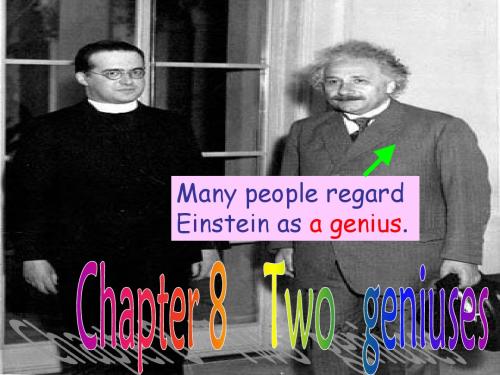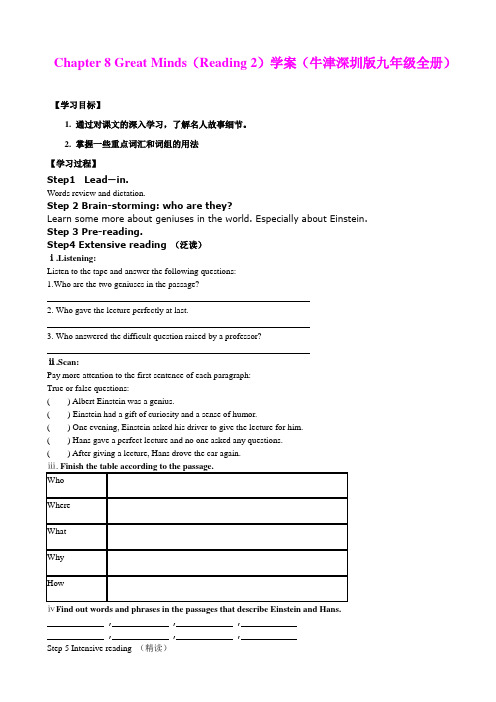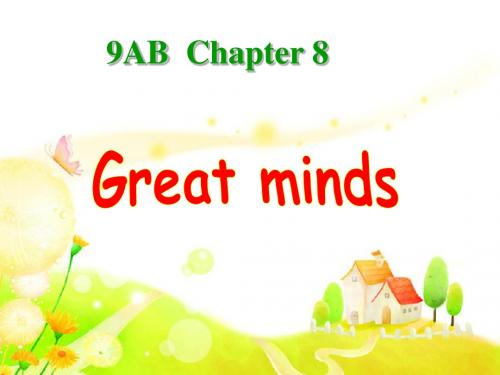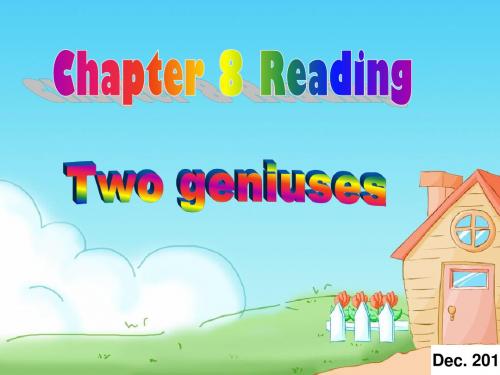Chapter 8 Great Minds(1) (Period Nine)教案(牛津深圳版九年级全册)
- 格式:doc
- 大小:46.50 KB
- 文档页数:3



Chapter 8 Great Minds(Reading 2)学案(牛津深圳版九年级全册)【学习目标】1. 通过对课文的深入学习,了解名人故事细节。
2. 掌握一些重点词汇和词组的用法【学习过程】Step1 Lead—in.Words review and dictation.Step 2 Brain-storming: who are they?Learn some more about geniuses in the world. Especially about Einstein.Step 3 Pre-reading.Step4 Extensive reading (泛读)ⅰ.Listening:Listen to the tape and answer the following questions:1.Who are the two geniuses in the passage?2. Who gave the lecture perfectly at last.3. Who answered the difficult question raised by a professor?ⅱ.Scan:Pay more attention to the first sentence of each paragraph:True or false questions:( ) Albert Einstein was a genius.( ) Einstein had a gift of curiosity and a sense of humor.( ) One evening, Einstein asked his driver to give the lecture for him.( ) Hans gave a perfect lecture and no one asked any questions.( ) After giving a lecture, Hans drove the car again.ⅲ. Finish the table according to the passage.ⅳFind out words and phrases in the passages that describe Einstein and Hans., , ,, , ,Step 5 Intensive reading (精读)ⅰRead paragraphs 1-3, finish the sentences.1. What made Einstein very famous?2. What invitations did he often receive?Key sentences:1.Many people Albert Einstein a genius.2. Einstein often said (he had) was curiosity, but this story shows that he also had .3.drive a genius like you, Dr Einstein.①.regard sb. as…把某人当作…Don’t _________ me _____ your servant!be regarded as…被看作…Zhang Yimou _____________one of the most famous film directors.②. gift have a gift for…有…的天赋=gift n.--- gifted adj. He music.③It’s a pleasure for sb. to do sth….It’s a pleasure for me to help you with EnglishIt’s my pleasure. (回复感谢), With pleasure. (回复请求) be pleased with sth. 对….感到满意, a pleasant trip ! 愉快的旅行He listened with _______ to the beautiful music.A. pleaseB. pleasureC. pleasantD. pleasedⅱRead paragraphs 4-6, answer the questions.1. Did Einstein want to give his lecture that night? Why?2.What did Hans offer to do?3.Why was Hans so confident?4.What did Einstein ask Hans not to do?Key phrases:1.On the way to…2. Let sb. down3. learn…by heart4. find out5. try to do sth.Read paragraph 7 to your partner, and then fill in the blanks:At the university, Hans was ______ and ______ a platform in a greathall. Einstein _______ the audience,_______ Hans _____ the lecture ________, and ________ the applause __________ⅳ.Read paragraphs 8-11 and study.1. When did the professor ask Hans a difficult question?A. When Hans was giving a lecture.B. Before Hans gave a lecture.C. Before Hans left the platform.2.Who answered the difficult question?A. HansB. EinsteinC. the professorKey sentences:1. He then asked a question ________difficult________Hans could not understand it at all.so + adj. + that从句= such + n. + that从句It’s ________ sweet tea that I can’t drink it.=The tea is ________ sweet that I can’t drink it.2. In fact, it’s so easy that even my driver knows how to answer it.ⅴRead paragraph 11 together.1. Who drove the car back?2. What did Einstein say to Hans?3. Can you use a sentence to describe the relationship between Hans and Einstein?Key phrases:1. offer to do sth. 主动提出去做某事。



C h a p t e r8学案4-Q u i z f o r r e a d i n g初三英语备课组Ⅰ选择合适的答案()1.t h i n k o f a s/c o n s i d e r a s A.w i t h o u t a n y m i s t a k e s()2.t r y d o i n g s t h B.h a v e a s e n s e o f h u m o u r()3.v e r y h u m o r o u s C.a t t e m p t t o d o s t h()4.f e e l l i k e d o i n g s t h D.s h o r t l y()5.l e t s b d o w n E.r e a g r d…a s()6.l e a r n s t h b y h e a r t F.w o u l d l i k e t o d o s t h()7.t a k e s b t o s o m e p l a c e G.l e a d s b t o()8.p e r f e c t l y H.m a k e s b d i s a p p o i n t e d()9.a c t u a l l y I.r e m e m b e r s t h()10.v e r y s o o n J.I n f a c tⅡ单项选择()1.W e o u r f a i l u r e t h e r e s u l t o f o u r c a r e l e s s n e s s.A.t h i n k o f;a sB.t h i n k o f;f o rC.r e g a r d;a sD.r e g a r d;f o r()2.---W h a t d o y o u t h i n k o f J o h n?---H e i s a m a n o f m a n y.H e c a n s i n g a n d d a n c e w e l l.A.t a s k sB.d e c i s i o n sC.g i f t sD.s u g g e s t i o n s()3.---H o w a b o u t____o p e r a l a s t n i g h t?---I s h o u l d s a y i t w a s____s u c c e s s.A.t h e;aB.t h e;/C.a;aD.a;/()4.---I s y o u r f a t h e r a P a r t y m e m b e r?---Y e s,H e t h e P a r t y f i v e y e a r s a g o.H e a P a r t y m e m b e r f o r f i v e y e a r s.A.j o i n e d;h a s b e e nB.j o i n e d;w a sC.h a s j o i n e d;h a s b e e nD.j o i n e d i n;h a s b e e n()5.---H o w d o y o u s t u d y E n g l i s h w e l l?---I a l w a y s s o m e g o o d p a s s a g e sA.r e a d…b y h e a r tB.s t u d y;d o w nC.h e a r;f r o mD.l e a r n;b y h e a r t()6.---S a n d y,y o u c a n u s g a m e s.---A l l r i g h t.I’m c o m i n g.A.j o i n;t o p l a y i n gB.j o i n;t o p l a yC.j o i n;i n p l a y i n gD.j o i n i n g;i n p l a y()7.---O n w a y h o m e,t h e b o y s b o u g h t a n i c e p r e s e n t f o r t h e i r t e a c h e r.---O h,T h e t e a c h e r m u s t b e v e r y h a p p y.A.t h e y;t oB.h i s;/C.t h e i r;/D.t h e i r;t o()8.J o h n o f f e r e d h i s b i k e t o m e.A.t o b o r r o wB.b o r r o wC.t o l e n dD.l e n d()9.---W h y d o e s n’t M a r y g o s h o p p i n g w i t h u s t h i s a f t e r n o o n?---S h e i s v e r y b u s y t o d a y a n d h a s a l o t o f w o r k.A.t o d oB.d o i n gC.d o e sD.h a s d o n e()10.---W h a t d i d s h e s a y______y o u r a d v i c e?---S h e s a i d s h e w o u l d t a k e m y a d v i c e.A.i n r e p l y t oB.a n s w e rC.r e p l y t oD.r e p l y()11.---The worker were made _______ over 12 hours a day.--- How their boss is!A. work; cruelB. working; crueltyC. to work;cruellyD. to work;cruel()12. The park is ________ beautiful a place that ________ many people come to visit it every year.A. so; suchB. such; soC. such; suchD. so; so()13. It is ________ difficult for us ________ climb up the mountain.A. very; can’tB. too; notC. too; toD. very; to()14. (2010深圳中考)--- Mary, Would you like to the game?---I’d love to,but I have to finish the composition first.A.j o i n i n;t o w r i t eB.a t t e n d;w r i t i n gC.j o i n;t o w r i t eD.t a k e p a r t i n;w r i t i n g()15.---T h a n k s f o r y o u r h e l p.I a p p r e c i a t e i t.---A.W i t h p l e a s u r eB.I t d o e s n’t m a t t e rC.M y p l e a s u r eD.D o n’t s a y t h a tⅢ翻译句子1.他已经查明了借那本书的人。
Unit 2 Great mindsUnit 2 Great minds课文Word changes:fiction(n.)—fictional (adj. 虚构的, 小说的)—fictionist(n. 小说家, 创作家) genius(n. 天才、才能) talent, gift idiot白痴gift(n. 天赋)= talent(n. 才能)--- n. 礼物) = presentgifted(adj. 有天赋的, 有才华的)universe(n. 宇宙)—universal(adj. 普遍的,通用的,宇宙的)work(v. 运行)--- n. 工作a piece of workworks n. 工厂(视为单数) a gas works 文学艺术作品(视为复数 )curiosity(n. )--- curious(adj. 好奇的)--- curiously ( adv.好奇地)humour/ humor (n. 幽默)—humorous (adj. 幽默的)theory(n. 理论)--- theoretical (adj. 理论上的)----theoretically(adv.理论上)--- theorist (n. 理论家)theory of relativity: [物]相对论distant(adj.)--- distance(n. 距离)perfectly(adv.完美地)--- perfect(adj. 完美的)---perfection(n. 完美)--- perfectionist(n. 完美主义者)applause(n. 鼓掌)--- applaud (v. 鼓掌、赞扬)--- applausive(adj. 拍手欢呼的 ) wood n. 木头 woods 树林,森林 wooden adj. 木制的13. receptionist n. 接待员 receive v. 收到 receipt n. 收据 receiver n. 听筒purpose n. 目的, 意图; vt. 打算, 决意purposeful adj. 有目的的,有决心的 purposeless adj. 无目的14.observatory n. 天文台---observe v. 观察---observation n. 观察 ---observer n. 观察者15. research n. v. 研究;调查researcher n. 研究人员16. harmless adj. 无害的 ---harmful adj. 有害的 ---harmfully adv. 有害地 --- harm n. v. 伤害17. regard n. 关心; 考虑, 问候; vt. 视为; 尊重; 注视,regards n. 问候;致意 best regards18. astronomy ---astronomer 天文学家astronomical (adj.)天文学的,天体的19. enter (v.) 进入 = come into entrance (n.) 入口20. produce (vt. & vi.)生产--producer (n.) 生产者, 制造product ( n.) 产品21. fortune n. 庞大的财富, 财产n. 机会, 运气, 转机 = luck( adj ) fortunate –fortunately (adv.)unfortunate ---unfortunatelyluck—lucky—luckily unlucky—unluckily22. outstand v.〈古〉忍耐,停留,凸出,突出,卓然独立outstanding adj.突出的; 杰出的23 encourage—encouragement24.daydream –daydreamingphrases1.regard…as = consider...as=think of…as 把……视为/当作2.a gift for= a talent for = a present for有……的天赋3.attempt to do sth.=try to do sth. 尝试做某事4.have a sense of humor=be humorous 有幽默感5.work out = solve=deal with 解决,处理(问题)6.work= operate =run 操作运行7.on one’s way to sw. 在去往…的路上8.receive an invitation 收到邀请9. give a lecture =make a lecture=have a talk/speech 做演讲10.let sb down = disappoint sb.= make sb. disappointed 让某人失望11.What is the distance= How far is it 多远12.perfectly=without any mistake 完美地13.be pleased with sth =be satisfied with 让…满意It’s a ple asure (for sb) to do sth 有幸/荣幸做某事14.learn sth. by heart= know sth. by heart =remember=memorize熟记15.lead sb to =take sb to 带某人去lead to sth.= cause sth. 导致,引起16.find out=discover 找到发现17.be in trouble in doing sth.= have difficulty in doing sth. 做某事有麻烦/困难18.In fact=Actually =As a matter of fact19.offer sth. for sb. =offer sb, sth.=supply sb. with sth. =supply sth. to sb.=provide sb. with sth.=provide sth. for sb. 提供某人某物20.so + adj. + that从句=too + adj. to do= such + n. + that从句21.join in the applause=take part in the applause加入到鼓掌中22.have no idea+宾从= don’t know+宾从不知道23.take/leave a message 带/留口信24.in reply to sth.= to answer sth. 回复回答25.be in trouble / danger 处于困难或危险中26. in fact / as a matter of fact 实际上;事实上27.have ability to do sth. 有能力做……28. plan to do sth. 计划做……29. go on a trip to … 去…进行旅行30. need ( want / require ) to be done/need doing 需要被做…….31. all sorts of trouble 各种困难32. work as 任…职, 当…33. call sb. back= return one’s call回某人电话34. put sb. through to sb. 为...接通(电话)到..35. at the beginning of 在……的开始时36. make sure 确信37. do a research on ... 做有关…….的研究38. at the entrance of.. 在……入口处39. leave behind sth 身后留下……25.II. Paraphrasing:1. I don’t know how I can improve my English.I don’t know how to improve my English.2. We don’t want to make our teacher disappointed.We don’t want to let our teacher down.3. Jack made a perfect answer and the professor was very pleased. Jack answered perfectly and the professor was very pleased.4.I’m so tired that I can’t finish my homework today.I’m too tired to finish my homework today.5. Charlie Chaplin was a man with a sense of humor.Charlie Chaplin was a man who was good at making people laugh.6. Hans has learnt the lecture by heart.Hans has remembered the lecture.7. Hans gave the lecture perfectly instead of Einstein.Hans gave the lecture without any mistakes instead of Einstein.8. The question is so easy that even my driver knows the answer.The question is easy enough for my driver to know the answer.9. Einstein received invitations from the professors in the universities to explain his theories.The professors in the universities invited Einstein to explain his theories.10. I regard him as my best friend and we share everything in life.I consider him as my best friend and we share everything in life.11. Einstein had the gift of curiosity.Einstein had the talent of curiosity.12. Einstein was pleased to drive a genius like Hans.Einstein felt happy to drive a genius like Hans.13. He offered me a glass of wine.13. He gave me a glass of wine.II.同义短语。
Great minds教材分析教学目标1. Students can master and use infinitives fluently.2. Students can leave and take phone message in correctsituation.3. Students can get information from different ways, describeor talk about people or things according to the information4. Students can describe people from different angle and appreciateother’s advantages and achievements.教学重点e the language structure they learnt correctly.e phone language in suitable situation.3.How to get key information from reading and listening, then retelland describe them.教学难点How to get key information from reading and listening, then retelland describe them.教学关键The usage of infinitives.教法与学法指导group work, self study task-based learning cooperation教学环节主要教学步骤或内容学生主体活动教师活动设计意图时间分配第一环节复习回顾平移的基本性质,引入课题StepⅠ:Lead in .1.Guess the people in thepicture according to thekey information.1. Show a pictureand some keyinformation andask students toguess,1.Arouse theirinterest andget to thetopic.3第二环节观察操作、探索归纳平移的作StepⅡlisteningandspeaking .2.①Listen and get the keyinformation,then finishthe information-gettingexercises.②Listen and imitate thedialogue.③Make a new dialogue tomaster the phone language2. ①Present asituation:a dialogue talkingon the phone, playthe tape and askstudents to finishtheinformation-getting exercises.2.Learn to getkeyinformation,then imitate anddescribe.10法StepⅢ: Watching a showand answeringquestions. and describe to othersaccording to keyinformation.3.Appreciate a performanceand answer some questions.②Play again andguide the studentsto get informationby doing theexercise, thenpractice byimitating.③Show the scriptof the dialogue andnew keyinformation, askstudents toimitate.3.Play a singer’sperformance andask the question① Do you know thesong?②Which movie is itfrom?3.Make theclass livelyand prepare forthe next step .4第三环节课堂练习 StepⅣ: talk time 4. ①Discuss in groups of5,divide the task andchoose a leader.②Work according to theteacher’s informationthen share with each other..4. ①Divide thestudents intogroups②More questionbased on the filmto arouse thestudents’interests andcuriosity andguide the studentsto read and4.Learn to getkey informationand describethings andpeopleaccording todifferent13StepⅤ: show time StepⅤ: summary 5.A member in the grouppresent the result theydiscuss by the form ofmaking a phone call.6.Show the result to thewhole class by making aphone call to anothermember in the group.listen..5.Guide thestudent in everygroup and help themuse theinformation todescribe people bymaking a phonecall.6.Evaluate eachgroup and improvetheir ability ofdescribing peopleand things.information.5.Practice theability ofsummarizing anddescribing,make studentsuse correctsentences insuitablesituation.6.Summarize andevaluate whatthey learn toarouse thespirit ofcooperation andcompete.103课堂教学流程Lead in→listening and speaking →watching a show and answering questions →talk time →show time→summary效果评价与反思。
Period Nine
Teaching target
1 Explain the exercise assigned yesterday. Review the key expressions in this chapter.
2. Writing
Teaching courses
1. Explain the exercise.
Additional Exx.
2. Writing---Organizing a story
a. When you write a story, it is important to arrange the facts and events clearly into paragraphs. This makes it easier for readers to understand how the story develops. The arrangement of Two geniuses is an example.
Opening paragraphs: In formation about the characters (Einstein and Hans) and about the main event of the story (the lecture).
Other paragraphs: The events of the story in time order, i.e., what happened before, during and after the lecture.
Most stories are about the past, so verbs in stories are usually in the past tense except when we use direct speech.
b. What is a good story?
Writing a good story either in first or third person means to describing a sequence(连续) of events in an interesting, lively way.
c. A good story should consist of:
1. An interesting beginning to catch the reader’s attention and make him / her want to go on reading your story.
2. Good development in the main body to develop your story you should use appropriate(适当的) tenses, especially past ones.
e.g. Past Simple to describe the main events, past continuous to set the scene, past perfect to talk about events which happened before the main events, etc.
(e.g. He went out to the car. It was raining hard and a cold wind was blowing. He had rung her ten minutes before, so he knew she would be waiting.)
3. A good ending. If possible an unexpected(想不到) or unpredictable(出乎意料的) one, to surprise the reader and create a long-lasting
impression on your piece of writing.
d. Organization of the composition
Introduction
Paragraph Set the scene:
( who – where – when --- what)
Main Body
Paragraphs 2 –4
Development ( describe incidents leading up to the main event and the event itself in detail) Conclusion
Final Paragraph (refer to moods, consequences, people’s reactions, feelings, comments)
e. Look at the new words.
1. astronomer n.天文学家
2. astronomy n.天文学
3. harmless adj. 无害的
4. producer n. 生产者,制造者,制片人
5. April Fool’s Day 愚人节
6. Jupiter n. 木星
7. Neptune n. 海王星
e. Practice
Look at the story below. Fill in the blanks with the words in the box as well as your own ideas, Divide the story into five paragraphs. Change the form of the verbs as necessary.
Verbs
agree notice arrive jump obey play wait float
Other words
next wonderful instructions
Floating listeners
Sir Patrick Moore is a famous astronomer with a good _____ humor. He enjoys _________ harmless jokes on people. Some years ago, he gave a _______ series of talks about astronomy ______ radio. After one of these talks, his producer _______, ‘Your ______ talk ______ 9 a.m. on the first of April —April Fool’s Day. Why don’t you _____ joke _____ listeners?’ Moore _______. Moore _______ very busy _____ the next few days and forgot about the joke.
However, ____ way to the radio station on the first of April, he ____ some children jumping up and down ____ street. That _____ him an idea. He ____ the station and _____ his talk. It was about gravity.
At the end of ______, he _____ listeners, ‘The planets Jupiter and Neptune _____ very close to
_____ other this morning. This will reduce the gravity of Earth. If you ____ into the air at exactly 9.47 a.m., you ____ able to float around for several seconds.’
After the talk, Moore and the producer ____ to see what would happen. A few minutes ____ 9.47, the phone began ____. Some of the callers _____ that they_____ Moore _____ a joke ____ them. However, most of the _____ that they ____ Moore’s ____ and _____ air!
4 Assignments:
Additional Exx.。